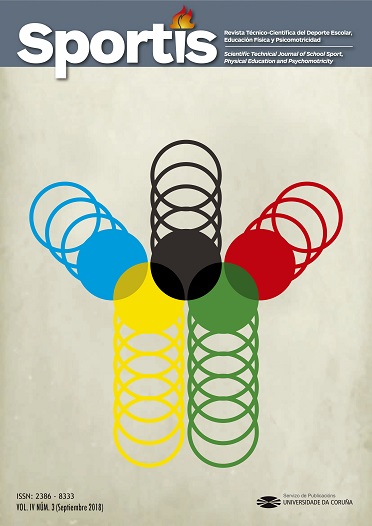¿Cómo diseñar la práctica para optimizar el desempeño y aprendizaje motor? Una revisión de literatura
Contenido principal del artículo
Resumen
Este manuscrito presenta una síntesis de literatura de cinco tipos de práctica más utilizados: variabilidad de la práctica, ejecución de la práctica, composición de la práctica, frecuencia de la práctica e interferencia contextual; y como estas pueden incidir en el desempeño o el proceso de aprendizaje de una destreza motriz. Este resumen permite a profesionales en ciencias del movimiento humano y carreras afines, la toma de decisiones en el momento de diseñar la sesión de trabajo.
Palabras clave:
Descargas
Detalles del artículo
Citas
Brady, F. (1998). A theoretical and empirical review of the contextual interference effect and the learning of motor skills. Quest, 50(3), 266–293. https://doi.org/10.1080/00336297.1998.10484285
Brady, F. (2004). Contextual interference: A meta-analytic study. Perceptual and motor skills, 99(1), 116–126. https://doi.org/10.2466/pms.99.1.116-126
Chan, J. S. Y., Luo, Y., Yan, J. H., Cai, L., & Peng, K. (2015). Children’s age modulates the effect of part and whole practice in motor learning. Human Movement Science, 42, 261–272. https://doi.org/10.1016/j.humov.2015.06.002
Cheong, J. P. G., Lay, B., Grove, J. R., Medic, N., & Razman, R. (2012). Practicing field hockey skills along the contextual interference continuum: A comparison of five practice schedules. Journal of Sports Science & Medicine, 11(2), 304–311. https://doi.org/10.1136/bjsm.2010.078972.56
Corrêa, U. C., Walter, C., Torriani-Pasin, C., Barros, J., & Tani, G. (2014). Effects of the amount and schedule of varied practice after constant practice on the adaptive process of motor learning. Motricidade, 10(4), 35–46. https://doi.org/10.6063/motricidade.10(4).2905
Coughlan, E. K., Williams, A. M., McRobert, A. P., & Ford, P. R. (2014). How Experts Practice: A Novel Test of Deliberate Practice Theory. Journal of Experimental Psychology. Learning, Memory & Cognition, 40(2), 449–458. https://doi.org/10.1037/a0034302
Czyż, S. H., & Moss, S. J. (2016). Specificity vs. Generalizability: Emergence of Especial Skills in Classical Archery. Frontiers in Psychology, 7. https://doi.org/10.3389/fpsyg.2016.01178
Davids, K., Button, C., & Bennett, S. (2008). Dynamics of skill acquisition. Champaign, IL: Human Kinetics.
Donovan, J. J., & Radosevich, D. J. (1999). A meta-analytic review of the distribution of practice effect: Now you see it, now you don’t. Journal of Applied Psychology, 84(5), 795–805. https://doi.org/10.1037//0021-9010.84.5.795
Driskell, J. E., Copper, C., & Moran, A. (1994). Does mental practice enhance performance? Journal of Applied Psychology, 79(4), 481–492. https://doi.org/10.1037/0021-9010.79.4.481
Fairbrother, J. T. (2010). Fundamentals of motor behavior. Champaign, IL: Human Kinetics.
Feltz, D. L., & Landers, D. M. (1983). The effects of mental practice on motor skill learning and performance: A meta-analysis. Journal of sport psychology, 5(1), 25–57. https://doi.org/10.1123/jsp.5.1.25
Fontana, F. E., Furtado Jr, O., Mazzardo, O., & Gallagher, J. D. (2009). Whole and part practice: a meta-analysis. Perceptual and motor skills, 109(2), 517–530. https://doi.org/10.2466/pms.109.2.517-530
Gomes, T. V. B., Ugrinowitsch, H., Marinho, N., Shea, J. B., Raisbeck, L. D., & Benda, R. N. (2014). Effects of Mental Practice in Novice Learners in a Serial Positioning Skill Acquisition. Perceptual and Motor Skills, 119(2), 397–414. https://doi.org/10.2466/23.PMS.119c20z4
James, E. G., & Conatser, P. (2014). Effects of Practice Variability on Unimanual Arm Rotation. Journal of motor behavior, 46(4), 203–210. https://doi.org/10.1080/00222895.2014.881314
Jiménez-Díaz, J., Salazar, W., & Morera-Castro, M. (2014). Interferencia contextual en el desempeño de destrezas motrices: Un metaanálisis. Pensar en Movimiento: Revista de Ciencias del Ejercicio y la Salud, 12(1), 1–24. https://doi.org/10.15517/pensarmov.v12i1.10572
Jiménez-Díaz, J., Salazar, W., & Morera-Castro, M. (2016). Meta-análisis del efecto de la interferencia contextual en el desempeño de destrezas motrices. Pensar en Movimiento: Revista de Ciencias del Ejercicio y la Salud, 14(2). https://doi.org/10.15517/pensarmov.v14i2.23830
Lee, T. D., & Genovese, E. D. (1988). Distribution of practice in motor skill acquisition: Learning and performance effects reconsidered. Research Quarterly for Exercise and Sport, 59(4), 277–287. https://doi.org/10.1080/02701367.1988.10609373
Lee, T. D., & Simon, D. A. (2004). Contextual interference. En A.M. Williams & N.J. Hodges (Eds), Skill acquisition in sport: Research, theory and practice (pp. 29–44). New York: Taylor & Francis/Routledge.
Leving, M. T., Vegter, R. J., de Groot, S., & van der Woude, L. H. (2016). Effects of variable practice on the motor learning outcomes in manual wheelchair propulsion. Journal of NeuroEngineering and Rehabilitation, 13(1), 100. https://doi.org/10.1186/s12984-016-0209-7
Magill, R., & Anderson, D. (2013). Motor Learning and Control: Concepts and Applications: Tenth Edition. New York: McGraw-Hill Higher Education.
Matsouka, O., Trigonis, J., Simakis, S., Chavenetidis, K., & Kioumomourjoglou, E. (2010). Variability of practice and enhancement of acquisition, retention and transfer of learning using an outdoor throwing motor skill by children with intellectual disabilities. Studies in Physical Culture & Tourism, 17(2), 157–164.
Mazzardo, O. (2004). Contextual interference: Is it supported across studies? (Tesis de Maestría). Universidad de Pittsburgh.
Moreno, F. J., & Ordoño, E. (2015). Variability and practice load in motor learning. RICYDE. Revista Internacional de Ciencias del Deporte, 11(39), 62–78. https://doi.org/10.5232/ricyde2015.03905
Panchuk, D., Spittle, M., Johnston, N., & Spittle, S. (2013). Effect of Practice Distribution and Experience on the Performance and Retention of a Discrete Sport Skill. Perceptual and Motor Skills, 116(3), 750–760. https://doi.org/10.2466/23.30.PMS.116.3.750-760
Park, J.-H., Wilde, H., & Shea, C. H. (2004). Part-Whole Practice of Movement Sequences. Journal of Motor Behavior, 36(1), 51–61. https://doi.org/10.3200/JMBR.36.1.51-61
Pauwels, L., Swinnen, S. P., & Beets, I. A. M. (2014). Contextual Interference in Complex Bimanual Skill Learning Leads to Better Skill Persistence. PLoS ONE, 9(6), e100906. https://doi.org/10.1371/journal.pone.0100906
Ranganathan, R., & Newell, K. (2013). Changing Up the Routine: Intervention-Induced Variability i... : Exercise and Sport Sciences Reviews. Exercise Sport Sciences Review, 41, 67–70. https://doi.org/10.1097/JES.0b013e318259beb5
Schmidt, R. A., & Wrisberg, C. (2008). Motor Learning and Performance: A Situation-based Learning Approach. Champaign, IL: Human Kinetics.
Shea, C. H., & Wright, D. L. (1997). An Introduction to Human Movement: The Sciences of Physical Education. Needham Heights, MA: Allyn and Bacon.
Taheri, H., Fazeli, D., & Poureghbali, S. (2017). The Effect of Variability of Practice at Execution Redundancy Level in Skilled and Novice Basketball Players. Perceptual and Motor Skills, 124(2), 491–501. https://doi.org/10.1177/0031512516684078
Yan, J. H., Thomas, J. R., & Thomas, K. T. (1998). Children’s age moderates the effect of practice variability: A quantitative review. Research Quarterly for Exercise and Sport, 69(2), 210–215. https://doi.org/10.1080/02701367.1998.10607686






